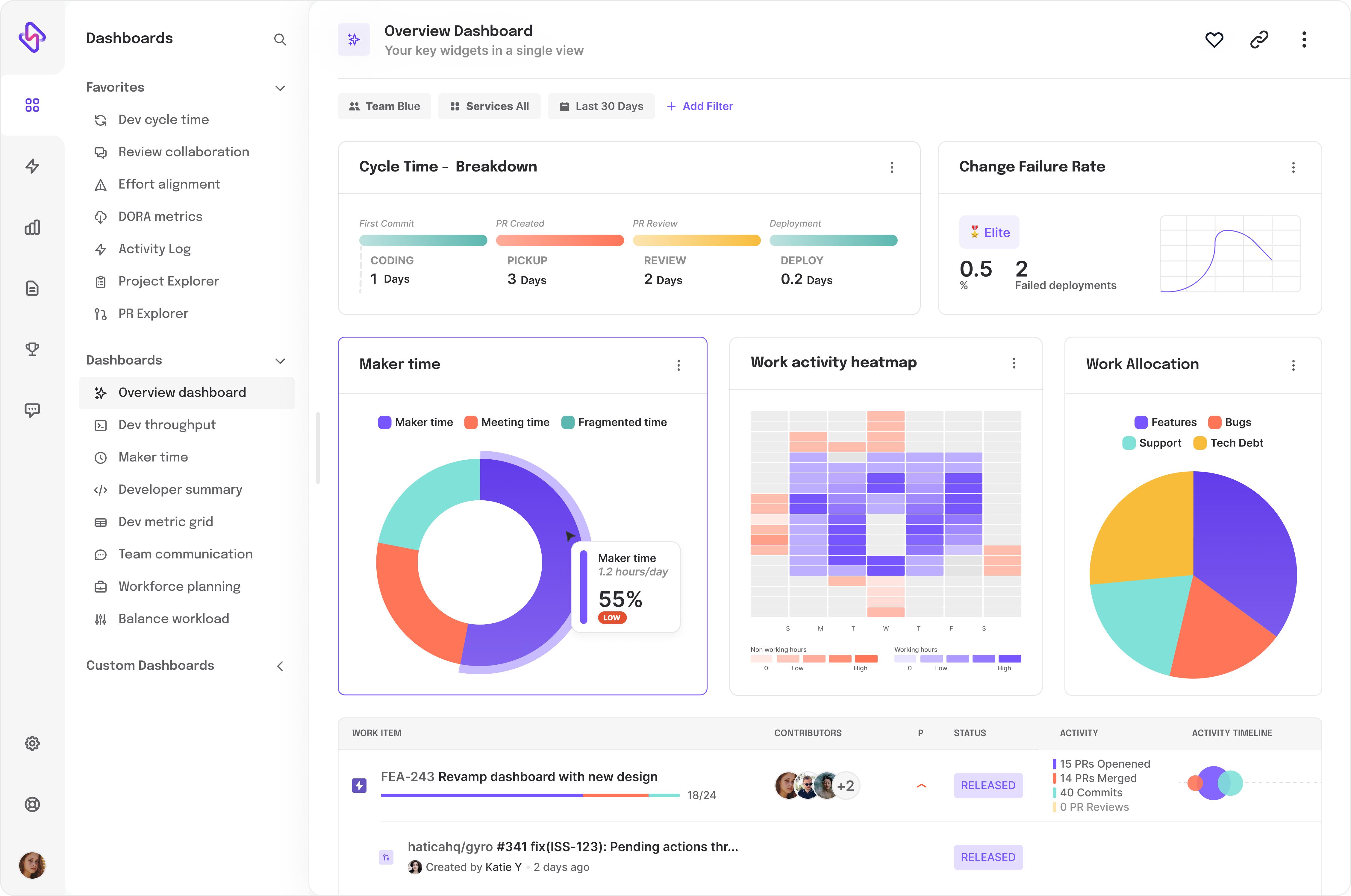PagerDuty needs no introduction as an incident management tool. With on-call management and 24/7 implementation support, PagerDuty empowers teams to have hassle-free incident operations. PagerDuty's USP is end-to-end visibility it offers into workflows so engineering teams can manage any escalation seamlessly.
- 300+ integrations with third-party tools for hassle-free collaboration
- Event and service grouping
2. Opsgenie
Opsgenie is a popular incident management tool with features such as alerting, incident response, and on-call management. It has over 200 tool and service integrations, including Slack, Jira, and AWS. Opsgenie's ease of use and excellent customer support are praised by users.
OpsGenie Features
- Mobile app for on-the-go incident management
- Customizable incident workflows
- Multi-level escalations for critical incidents
3. VictorOps (Splunk-On-Call)
Splunk-on-call, or previously, VictorOps is an incident management tool that includes features such as alerting, incident response, and collaboration. It has over 100 tool and service integrations, including PagerDuty, Jira, and AWS. Users laud VictorOps' user-friendly interface and powerful integrations.
VictorOps Features
- Incident timeline for easy incident investigation
- ChatOps integration for collaboration within the incident timeline
- Alert correlation to reduce noise and false positives
4. Zenoss
Zenoss is an IT monitoring platform that offers features like alerting, event management, and service impact analysis. It has integrations with over 300 tools and services, including AWS, VMware, and Microsoft Azure. Users praise Zenoss' ease of use and comprehensive monitoring capabilities.
Zenoss Features
- Business service monitoring for comprehensive service-level visibility
- Capacity planning and forecasting for proactive infrastructure management
- Advanced analytics for predictive incident management
5. Site24x7
Site24x7 is a cloud-based monitoring tool that offers features like website monitoring, server monitoring, and application performance monitoring. It has integrations with over 50 tools and services, including AWS, Google Cloud, and Microsoft Azure. Users praise Site24x7's easy-to-use interface and comprehensive monitoring capabilities.
Site24x7 Features
- Real-time user monitoring for improved user experience
- AIOps-powered anomaly detection for faster incident resolution
- Root cause analysis for detailed incident investigation
6. Datadog
Datadog is a cloud-based monitoring and analytics platform that offers features like alerting, monitoring, and visualization. It has integrations with over 400 tools and services, including AWS, Kubernetes, and Docker. Users praise Datadog's powerful analytics capabilities and extensive integrations.
Datadog Features
- APM tracing for end-to-end application performance monitoring
- Machine learning-powered anomaly detection for proactive incident management
- Live process monitoring for comprehensive infrastructure visibility
7. Nagios
Nagios is an open-source monitoring tool that offers features like alerting, notification, and visualization. It has integrations with over 5,000 plugins and add-ons, including AWS, MySQL, and Elasticsearch. Users praise Nagios' flexibility and scalability.
Nagios Features
- Plugin development for customized monitoring capabilities
- Distributed monitoring for large-scale IT infrastructure
- RESTful API for easy integration with other tools
8. AlertOps
AlertOps is a comprehensive incident management platform that offers a wide range of features, including alerting, on-call scheduling, and automation. With AlertOps, you can easily manage your incidents from a single dashboard, collaborate with your team members, and automate your response workflows.
AlertOps Features
- Two-way integrations with popular collaboration tools like Slack and Microsoft Teams
- Integration with popular ITSM tools like ServiceNow and Jira
- Customizable reporting for detailed incident analysis
9. New Relic
New Relic is a cloud-based monitoring and analytics platform that offers features like application performance monitoring, infrastructure monitoring, and alerting. It has integrations with over 300 tools and services, including AWS, Docker, and Kubernetes. Users praise New Relic's easy-to-use interface and comprehensive monitoring capabilities.
New Relic Features
- Distributed tracing for complex application architectures
- Real user monitoring for end-to-end user experience visibility
- Incident response team dashboards for real-time incident management
10. Prometheus
Prometheus is an open-source monitoring tool that offers features like alerting, visualization, and a time-series database. It has integrations with over 100 tools and services, including Kubernetes, Grafana, and AWS. Users praise Prometheus' powerful monitoring capabilities and scalability.
Prometheus Features
- Customizable alerts with multi-dimensional data filtering
- Service discovery for dynamic infrastructure monitoring
- Long-term data storage for detailed trend analysis
11. Jira Service Desk
Jira Service Desk is a well-known solution for managing customer inquiries and resolving issues. It's like a customer support hub that connects seamlessly with Jira, helping teams handle questions efficiently. Users find it easy to work with, and they appreciate how they can adjust it to fit their own needs.
Jira Service Desk Features
- A simple system for handling customer questions
- Works together with Jira to solve problems effectively
- Can be customized to match what your organization requires
12. NinjaOne
NinjaOne is a complete platform designed to help manage incidents smoothly. It offers many ways to make incident response and working together better. The easy-to-use design and strong connections to other tools help teams fix incidents quickly. People find NinjaOne’s incident timeline and ChatOps features especially helpful for talking during incidents.
NinjaOne Features
- An easy-to-use platform for incident management
- Incident timeline for checking incidents step-by-step
- ChatOps lets everyone work together in the incident timeline
Zabbix is an open-source monitoring tool with features such as alerting, notification, and visualization. It has over 100 tool and service integrations, including Nagios, Jira, and AWS. Zabbix's powerful monitoring capabilities and flexibility are praised by users.
Zabbix Features
- Network discovery and mapping for easier network management
- Customizable dashboards for real-time data visualization
- Remote monitoring for distributed IT infrastructure
To minimize the impact of security incidents and protect their operations and reputation, organizations of all sizes and industries must employ effective incident management. While PagerDuty has been a popular incident management tool, it's important to look into other options that may offer better features, capabilities, and pricing.
In this article, we looked at the top 12 incident management tools, ranging from open-source tools to enterprise-grade platforms. Each of these options provides distinct features and benefits that can assist you in improving your incident response capabilities and streamlining your incident management processes.
The importance of having an incident response plan in place is one key takeaway from this article. With only 45% of companies of all sizes implementing an incident response plan, organizations must invest in incident management processes and tools to mitigate the impact of security incidents. Additionally, it is critical to review and update your incident response plan on a regular basis to ensure that it remains effective in the face of evolving threats and organizational changes. You can reduce the impact of security incidents and protect your organization from the costs of data breaches by selecting the right incident response tool and having an effective incident management plan in place.
To make the most of your incident response system, an engineering analytics tool is the need of the hour. Hatica offers metrics across 13 dashboards, powered by CI/CD tools, Jira, Asana, PagerDuty, OpsGenie, and GitHub. By collating tool activities at one place, Hatica helps teams streamline their workflow, cut through the clutter of unwanted alerts, and improve productivity.
Subscribe to the Hatica blog today to read more about unblocking developers, and boosting productivity with engineering analytics.



